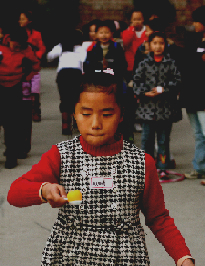|
|
What is PLAY ? Why do preschool kids play more than study?
Why spend so much time playing ? Shouldn't they be studying ?


Let's look at different descriptions and views of play by various sources and people:World Book Dictionary defines play as :
"something done to amuse oneself; fun; sport, recreation." Emory S Bogardus referred to it as :
"Those activities which are not consciously performed for the sake of any reward beyond themselves" Friedrich Froebel(1782-1852):
"graduated toys provides early exercise in geometric, artistic and mathematical skills." Maria Montessori (1870-1952):
"didactic play materials expand pre-mathematical understanding and sensory training. Sigmund Freud (1856-1939):
"there is therapy / healing through play. Jean Piaget (1896-1980):
Play contributes to cognition Jacques Rosseau:
Child's play is his work
CHARACTERISTICS OF PLAY |
|
|






